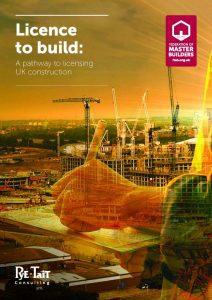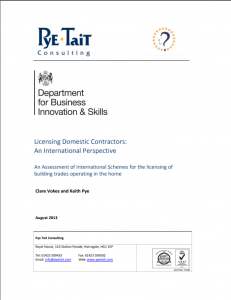Licensing the UK construction industry
In the UK, any person or company is legally allowed to undertake construction work without having to demonstrate a minimum level of competence. This means that our construction industry is not as safe, professional or productive as it might otherwise be. Other countries, such as Germany and parts of Australia and the US, have a licensing scheme, which ensures that those operating in the construction industry have the right skills and experience to do so. A licensing scheme for the UK construction industry has the potential to professionalise our sector, improve its image and increase the quality of the built environment.
There is broad support for licensing from consumers, industry and policy makers. The Government has challenged the industry to develop the blueprint for a licensing scheme and this is the role of the cross-industry Licensing Task Force. The Task Force is Chaired by Liz Peace who is passionate about improving quality and standards in the industry and to that end, believes a licensing scheme for UK construction would be transformative.
The benefits of a mandatory licensing scheme

1. Remove incompetent and rogue traders from the industry
A licensing scheme would allow the industry to enforce a basic level of competence at entry level.

2. Offer a much higher level of consumer protection
Research shows that one in three homeowners have been put off doing major home improvement work for fear of hiring a cowboy builder.

3. Increase construction output to boost the wider economy
Licensing would increase confidence in the industry and lead to more work being commissioned.

4. Drive up quality, professionalism and productivity
Gaining and renewing the licence would provide a means of enabling a Continued Personal Development scheme.

5. Improve health and safety compliance
Basic health and safety testing could be included an entry criterion for a licence.

6. Improve the image of the industry
Increasing quality and professionalism would help attract more new entrants and ease the skills crisis.
Research
In July 2018, the Federation of Master Builders (FMB) published a research report ‘Licence to build: A pathway to licensing UK construction’, which sets out the case for licensing and looks at a potential framework. The FMB represents more than 8,000 small and medium-sized (SME) construction firms across the UK. 77% of FMB members would support the introduction of a licensing scheme, and only 8% disagreed with the idea
Licensing Task Force
The construction industry has come together to develop the licensing proposal and decide how it should work in practice. Once agreed, the Government will consult on the industry’s proposal. The Task Force is chaired by Liz Peace and the full list of members is below.

Liz Peace
Chair
Licensing Task Force












Toby Lloyd
Campaign Advisor
Task Force observer






Fergus Harradence
Deputy Director, Construction
BEIS (Task Force observer)

Sue Westcott
Team Leader – Housing Performance
Ministry for Housing (Task Force observer)
Supporters
More than 30 organisations support in principle the proposal for a mandatory licensing scheme
Parliamentarian Support

Emma Hardy MP

Dr Alan Whitehead MP

Lord Shipley OBE
Testimonials
The proposal for licensing has received cross-party support. Click here to listen to the former Construction Minister and Shadow Chancellor of the Exchequer talking about the benefits of licensing at an event in Parliament.
Rt Hon John McDonnell MP
Richard Harrington, former Construction Minister
Pledge


MP’s viewpoint – David Morris
A few months ago, I was contacted by one of my constituents Paula De Santana, who had been a victim of a rogue trader. As

Builder’s viewpoint – Melanie Fasham
Registration of Builders – Victoria, Australia. As a builder of residential houses in Victoria, Australia, I am required to hold a Domestic Builder – Unlimited

Homeowner’s viewpoint – Paula de Santana
In 2018, we commissioned a firm to conduct some repair work to our roof as well as some landscaping work. The company seemed legitimate and


















































